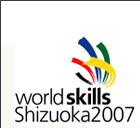| WSC2007>A short history of the WorldSkills Competition |
A short history of the WorldSkills Competition
An idea is born
In 1946 there was a great shortage of skilled workers in Spain. José Antonio Elola Olaso, Director-General of OJE (Spanish Youth Organization), saw that it was necessary to convince young people – as well as their parents, teachers and prospective employers – that their future depended on an effective vocational training system.
Mr. Olaso chose Francisco Albert-Vidal to develop a concept and his team came up with the idea of a competition as the best way of promoting vocational education. Young people would compete, educators could network and improve their methods, and visitors would be able to see a broad range of skills being demonstrated.
Great interest
Right from the start, state agencies, enterprises and religious vocational training schools were enthusiastic about the idea. This simple yet brilliant idea of watching people from different trades at their workstations proved a great success. In 1947 some 4,000 apprentices from a dozen mechanical trades took part in the first National Competition in Spain.
But the initiators wanted much more than that. They wanted to motivate youngsters to compete, attract them to vocational training and to compare the skills and abilities of people from different countries. The first step was an “Iberian” Competition with 12 young skilled workers from neighboring Portugal.
Europe joins in
Observers from numerous countries were invited to the Competition and their enthusiasm resulted in the 1953 competition taking place with young people from France, Germany, Morocco, Switzerland and the United Kingdom.
In June 1954, the first Organizing Council – with official and technical representatives from the participating countries – was established to draw up the rules for the competitions.
Going global
In 1958 the Competition was held outside Spain for the first time – in Brussels, which was hosting the World’s Fair that year. Various European countries hosted the annual competition until 1970, when Japan became the first non-European host country, holding the Competition in Tokyo.
A global success
In the early 1980s, it was decided to hold the Competition every two years rather than each year. In 1999, the Youth Skills Olympics was renamed the WorldSkills Competition and the international use of the WorldSkills name and logo by Members was encouraged to promote branding and awareness. WorldSkills International currently has 46 Member countries/regions and over 45 skill categories.
In 1946 there was a great shortage of skilled workers in Spain. José Antonio Elola Olaso, Director-General of OJE (Spanish Youth Organization), saw that it was necessary to convince young people – as well as their parents, teachers and prospective employers – that their future depended on an effective vocational training system.
Mr. Olaso chose Francisco Albert-Vidal to develop a concept and his team came up with the idea of a competition as the best way of promoting vocational education. Young people would compete, educators could network and improve their methods, and visitors would be able to see a broad range of skills being demonstrated.
Great interest
Right from the start, state agencies, enterprises and religious vocational training schools were enthusiastic about the idea. This simple yet brilliant idea of watching people from different trades at their workstations proved a great success. In 1947 some 4,000 apprentices from a dozen mechanical trades took part in the first National Competition in Spain.
But the initiators wanted much more than that. They wanted to motivate youngsters to compete, attract them to vocational training and to compare the skills and abilities of people from different countries. The first step was an “Iberian” Competition with 12 young skilled workers from neighboring Portugal.
Europe joins in
Observers from numerous countries were invited to the Competition and their enthusiasm resulted in the 1953 competition taking place with young people from France, Germany, Morocco, Switzerland and the United Kingdom.
In June 1954, the first Organizing Council – with official and technical representatives from the participating countries – was established to draw up the rules for the competitions.
Going global
In 1958 the Competition was held outside Spain for the first time – in Brussels, which was hosting the World’s Fair that year. Various European countries hosted the annual competition until 1970, when Japan became the first non-European host country, holding the Competition in Tokyo.
A global success
In the early 1980s, it was decided to hold the Competition every two years rather than each year. In 1999, the Youth Skills Olympics was renamed the WorldSkills Competition and the international use of the WorldSkills name and logo by Members was encouraged to promote branding and awareness. WorldSkills International currently has 46 Member countries/regions and over 45 skill categories.

